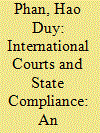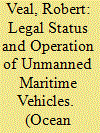| Srl | Item |
| 1 |
ID:
165117


|
|
|
|
|
| Summary/Abstract |
The final judgment in the maritime boundary delimitation case between Ghana and Côte d’Ivoire was delivered by an ad hoc special chamber (the Chamber) of the International Tribunal for the Law of the Sea (ITLOS) on 23 September 2017. The decision addressed important legal questions relating not only to maritime boundary delimitation but also to the balancing of various rights and interests at the provisional measures stage and international responsibility for unilateral resource exploitation activities in disputed zones pending delimitation. This article analyzes the decision of the Chamber with respect to its findings on tacit boundary agreements, delimitation methodology, and international responsibility.
|
|
|
|
|
|
|
|
|
|
|
|
|
|
|
|
| 2 |
ID:
165120


|
|
|
|
|
| Summary/Abstract |
This article investigates the effect of dispute settlement decisions under the 1982 United Nations Convention on the Law of the Sea (UNCLOS) and whether and how states, particularly great powers, comply with these decisions. State practice suggests that an overwhelming majority of the decisions by UNCLOS dispute settlement bodies have been implemented. Significantly, not only small states but also the permanent members of the United Nations Security Council have complied with UNCLOS dispute settlement decisions even when they “lost” in the proceedings that were unilaterally initiated against them.
|
|
|
|
|
|
|
|
|
|
|
|
|
|
|
|
| 3 |
ID:
165119


|
|
|
|
|
| Summary/Abstract |
The interpretation of Article 121(3) of the 1982 U.N. Convention on the Law of the Sea (UNCLOS) was a key part of the Sino-Philippine Arbitration on the South China Sea Award issued in July 2016. This article uses the principles of treaty interpretation codified in Article 31 of the 1969 Vienna Convention on the Law of Treaties to evaluate the interpretation process. The Tribunal paid little attention to the text such as “rocks” in the plural form and overlooked the context of Article 121(3). The travaux préparatoires identified by the Tribunal was based on materials of doubtful weight.
|
|
|
|
|
|
|
|
|
|
|
|
|
|
|
|
| 4 |
ID:
165118


|
|
|
|
|
| Summary/Abstract |
The number of unmanned maritime vehicles (UMVs) and their potential applications in the marine space are growing constantly. Because of their comparatively small size and limited operations, only modest attention has been paid to how they fit into the international legal framework. Many UMVs may not be considered to fall under the definition of "ship" so as to enjoy states' rights of navigation under UNCLOS. Therefore states, manufacturers, and investors remain uncertain about the rights and obligations regarding UMV operations in the various maritime zones. This article addresses these questions for a range of UMVs with differing levels of autonomy. It argues that the international legal framework delegates the question of whether a UMV is a ship or not to the flag state's national laws. The article suggests that such a determination will be binding on other states. With respect to UMVs that do not fall under the definition of ship, there is remaining uncertainty about whether any navigational rights in the jurisdictional zones of other states are available, while it is argued that such rights do exist in the areas beyond national jurisdiction. The article also considers the extent to which today's UMVs can comply with the international framework for ensuring safety at sea. For those UMVs falling under the definition of ship, compliance with the current regulatory framework for shipping is required and compliance will be more difficult as the level of UMV autonomy increases.
|
|
|
|
|
|
|
|
|
|
|
|
|
|
|
|